The Awakening
In terms of my awakening. This really probably started around college when I was in school at UCSD. I think one of the movies that came out during that time was Super Size Me, which if you may have seen, you may remember that it’s about this guy who basically eats McDonald’s for an entire year straight. And you can imagine that if you’re eating fast food for an entire year straight, it’s probably not the best thing for you.
And the movie demonstrates how bad fast food is and what it can do to your body. He gained a bunch of weight. He got high blood pressure from all the sodium that was in McDonald’s. He also got high cholesterol, which is not good, from all the fat that’s in fast food.
And that really woke me up to not eating fast food. I used to eat it on somewhat of a regular basis growing up, especially in high school. And in college, you aren’t really particular about the quality of food. You just like food that tastes good and is quick and cheap.
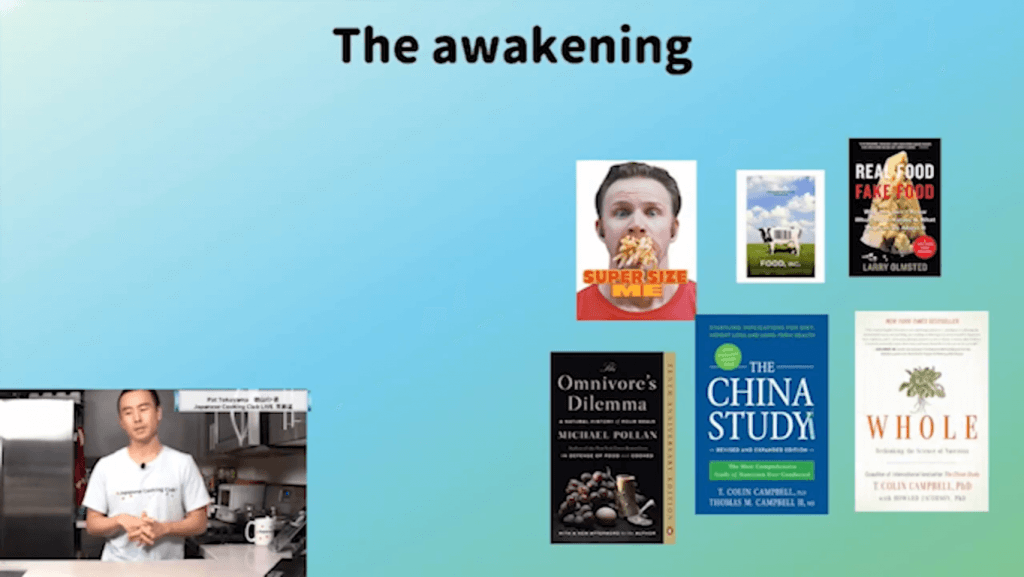
That was kind of my perspective. But then, once I saw that movie, I stopped. I almost went pretty much cold turkey. And now, I really don’t eat that much fast food. Maybe like two or three times a year at the most. I really try to stay away from it.
You may have heard of this movie called Food, Inc. That’s another one that woke me up to food. Just the industry, the food industry in terms of livestock like cows, chickens, and things like that. And then, there’s another book called Real Food/Fake Food, which is exactly what it would be about.
Parmesan cheese, olive oil, wine, things that have high value and are often counterfeit. That’s what that book is about. And in terms of getting me into the plant-based lifestyle, where I am today, I credit these three books that you see on the bottom of the slide.
So we had the Omnivore’s Dilemma by Michael Pollan, which I highly recommend. His books are very easy to read, as well as the China study and Whole.
Those are the books that really got me to change my diet to where I am today. They are key books that are very relevant today. The research is still relevant and we’re still doing more research to support some of those initial findings in those books. There’s a lot of other things that have come out since then.
I haven’t had a chance to catch up though. So I know that there’s a lot of books like How Not to Diet. I think Dr. Greger is his name and it’s on my reading list to do this year for 2020. Maybe some of you guys have heard of his videos, his website and his books.
There are also a few movies like What the Health. I don’t know if you guys have heard of that. That’s another movie that you might be interested in. And also Game Changers seems to be a very popular one these days, which is about athletes who have switched to a plant-based diet and can still perform at their very, very professional, athletic ability, despite eating plant-based foods.
So those are a couple of things that you might be interested in checking out if you haven’t already. And I can certainly link them in the description below later on as well.
Why did I choose to change my lifestyle?
There are many reasons. It wasn’t just one thing.
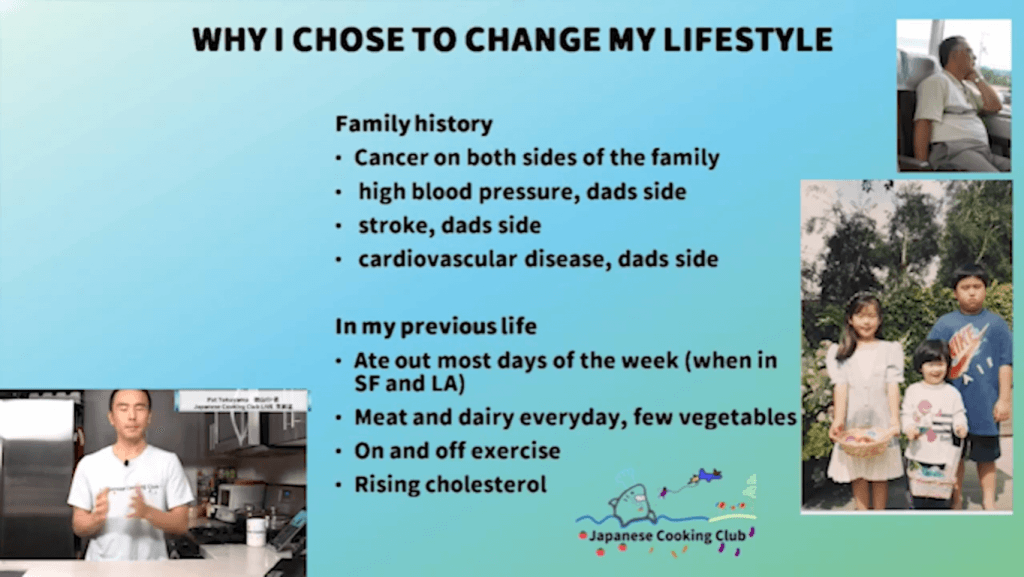
For me, my family history is not — I guess — clean, in the sense that there’s a lot of chronic disease that my parents, my grandparents, and their grandparents have/had. For example, I have a lot of cancer in my family history. Same with high blood pressure on my dad’s side, as well as stroke and heart disease.
My dad actually got a stent placed earlier this year, which if you don’t know what a stent is, it’s basically a metal tube that they put into one of your heart vessels to open it up because it has been clogged with plaque. And plaque builds over time. It usually happens over many years of eating unhealthy food.
And basically, when your vessels get clogged, it can lead to a heart attack, which is why you need to put a stent in, or have an operation to open up that blood vessel so that the blood can flow to your heart. My dad just had that done this year.
You can tell just from that, that I do have a significant amount of cardiovascular disease history. And then, that’s one of the risk factors for me as well, developing that myself as I get older. In addition, I lived in San Francisco and when I lived in LA, both of which are foodie cities. So if you know, there are a lot of different types of ethnic food, and good restaurants that you can eat out at. And so, when I lived up in SF and LA, I ate out all the time. I didn’t really cook too much.
I also ate meat and dairy pretty much every day, three times a day, every meal. And every day of the week. The typical American diet. I think that’s what a lot of Americans eat these days. And I don’t know if you’ve ever heard of that acronym, standard American diet, which if you abbreviate it, it’s the “sad” diet, SAD. And it makes sense because it’s not exactly the healthiest diet. If you think about it, it’s mostly meat and potatoes,
And it doesn’t really emphasize vegetables. I wasn’t really too committed to exercising on a regular basis as well. As you can imagine when you’re younger, you kind of feel invincible. You have that, “Oh, it’s never going to happen to me. I’m still young , and I don’t need to worry about it until I get older.” But, eventually, as you get older, it’s gonna catch up to you and you will notice that you do need to pay attention.
And also going to my annual physicals. Go see your doctor for your annual physical, I do recommend that you go see your doctor to make sure you have your labs checked because you never know what they might find. Maybe your blood work will come back clean, or maybe they might find something you know, ominous. Maybe there’s something wrong with your blood count or something, which could potentially indicate that you have some sort of illness. I recommend that you go see your doctor and get your annual physical done.
And so when I’ve done that the past few years, what I’ve noticed is now that I’m older, my cholesterol levels have started to increase. So there’s good cholesterol and bad cholesterol. My good cholesterol has — it used to be relatively high. So HDL is good cholesterol. And that used to be relatively high. Around 80 to 90, so it’s atypical. So maybe my Japanese genes are allowing me to have good high cholesterol. But my bad cholesterol, the LDL (low-density lipoprotein has gradually started to creep up.
It used to be relatively low when I was in my twenties. It was usually around 60 to 70, which is a good range. But now that I’m around 35-ish it’s crept up and it’s around 90 to 100, which really kind of woke me up and said to me that I needed to start paying attention to the foods that I ate. So that’s what I did.
Why I chose to change
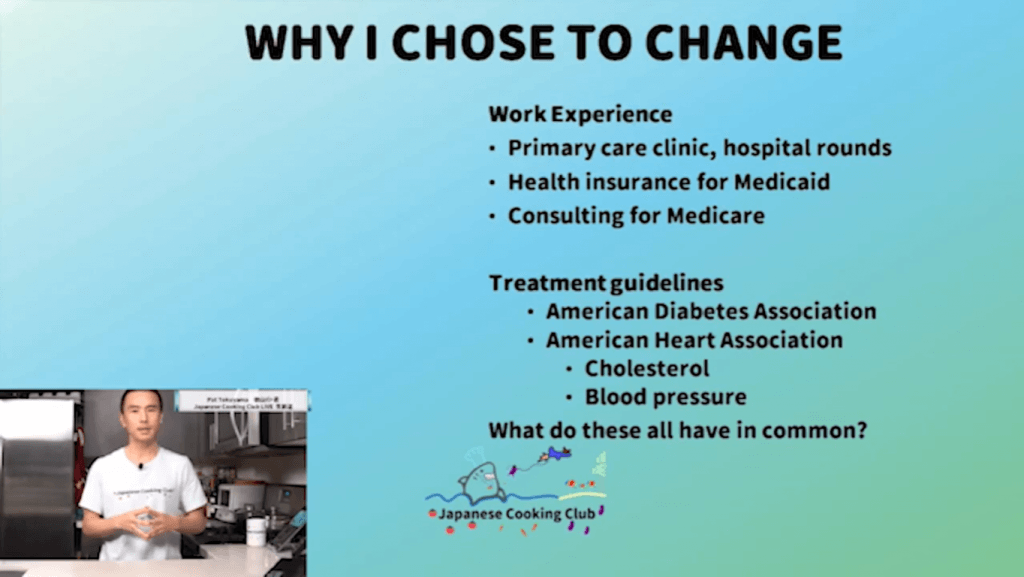
In terms of why I chose to change aside from my family history, aside from reading those books, aside from my cholesterol levels, from my lab tests. My other reason for changing is my work experience.
So some of you who are not in healthcare would not have this opportunity to really see very sick patients and what happens to them when they’re getting treated with medications.
Or when they’re getting treated with surgery. Maybe they come into the hospital and they’re admitted with all kinds of different chronic diseases. Comorbidities are what we call them in medicine.
That means they have multiple diseases. And they’re usually not in very good shape at that point. So I’ve seen these types of people in the clinics and hospitals, as well as at health insurance, where I used to work.
We would have these multidisciplinary rounds. We’d work as a team with a case manager, also a physician, usually a nurse, and the patient, to try to get them the care that they need. Because we were working with Medicaid patients. Oftentimes, they wouldn’t have the resources that they needed to go and get the proper health care. A lot of them were very vulnerable in that sense. And they need people to help them and to keep them healthy and to get their medications and their doctor visits covered.
All those different things really got me to wake up. If you guys haven’t woken up yet, maybe some of this training will help you wake up. And that’s exactly the reason why I created it. If you are somewhat familiar with the way medicine works today, you may know that guidelines are often used as a reference to treat patients.
For example for diabetes patients, if you have diabetes, there are the American Diabetes Association treatment guidelines that are used. And they help to guide the way that doctors will prescribe medications for people who are diagnosed with diabetes.
For example, first, you try a drug called Metformin. If that doesn’t work to control diabetes, or if there’s a side effect or adverse drug reaction and the person can’t handle it or doesn’t want to take it, then they’ll add on a different drug. And if a different drug doesn’t work or it becomes ineffective, then they’ll add on a third drug and so on and so on.
So it’s kind of like a treatment guideline or instruction manual on how to treat certain diseases. So there are all kinds of different types of guidelines, some of which are for diabetes, some are for the heart. So the American heart association is one that has guidelines on how to treat cholesterol and also how to treat blood pressure.
And can you guess what all three of those guidelines have in common? Something that these three treatment guidelines for diabetes, cholesterol, and high blood pressure all have in common is lifestyle.



Konnichiwa! (Hello!) I'm Pat Tokuyama, a Japanese tofu cookbook author, who travels for music, food, and adventure. If you like Japanese tea, checkout some of the newestorganic japanese tea, matcha bowls and noren and more!
** Curious about the Plant Based Japanese Cooking Club? ** Learn more here!
Primary Prevention
Primary prevention is the medical term for preventing disease from happening in the first place.
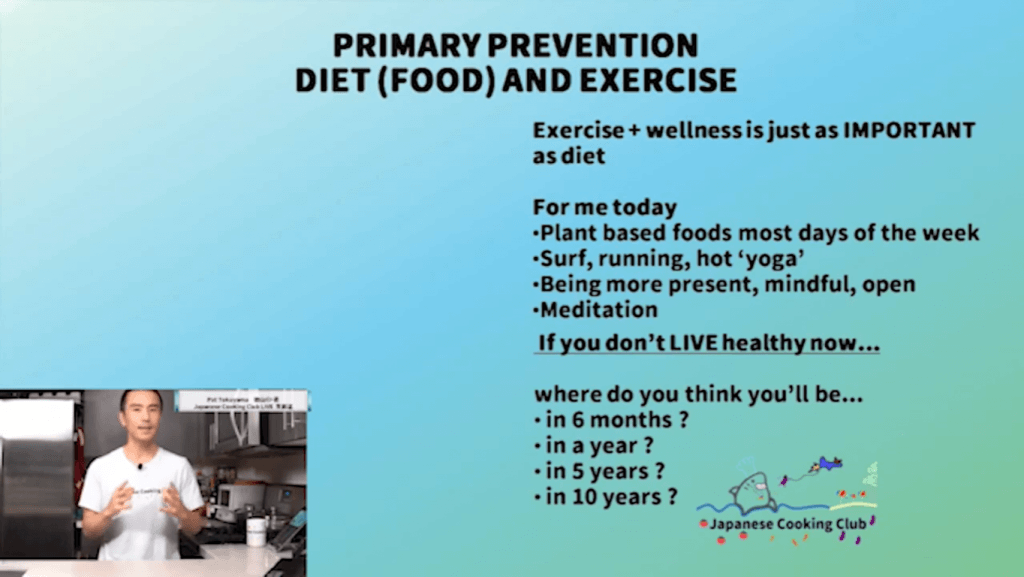
So if you can imagine, if you can do that, that can ultimately mean that you’ll never get the disease at all because it’s been prevented from the very beginning from ever happening!
As opposed to getting the disease, and then treating it after the fact, which is the situation that most people are in, including my dad. Usually, once you have a disease, it’s not so easy to get off of medication.
For example, you become reliant on your medications, or you think that “Oh, it’s just so much easier to just take a pill. Why should I change my diet?” Or “Why should I exercise when I can change or when I can just take a pill?” And that’s the wrong attitude to have. That’s a very disempowering attitude, and it’s not exactly a healthy one.
And that’s actually one of the reasons why one of my personal goals and a goal for you, all of the people that I work with, is to never have to take a chronic prescription medication. And the way that you can do that is with lifestyle. Diet, the food that you eat, and exercise. So I’m going to do my best to educate you guys on the food aspect.
Primary prevention, as I mentioned, is all about food and exercise, and making sure that you never get the disease in the first place. And yes, it is possible to prevent those chronic diseases like high blood pressure, diabetes, hypertension, from ever happening if you exercise and if you take responsibility for the food that you eat.
For me, it’s not just about diet and exercise. I also am somewhat into mindfulness or meditation. That seems to be starting to get more popular these days. Regardless of your religion, faith, or beliefs, you can be mindful. And meditation is just one form of being mindful, just being present to where you are today, right now, for example. That’s being mindful. As opposed to letting your mind wander off and go somewhere else on some sort of a thought party or a tangent.
Some of the things that I do to exercise as I mentioned, is surfing. That’s one of my favorite exercise activities. I also go running when there is no surf or do hot yoga. With regard to food. I am very, very into my plant-based foods. So I try to eat as many plants as possible. I don’t eat meat or fish anywhere near as much as I used to, just a few years ago.
One of the things that I would recommend for you is to not compare yourself to me because I started three years ago. And where I am today is going to be different from where you are right now, and where you want to be.
One of the things that I always advocate is to keep track of your goals. Try to figure out where you are today, where do you want to be tomorrow, and focus on that. It doesn’t matter where everybody else is because wherever you are in life, what you’re going to realize if you haven’t already, is that there’s always going to be somebody who’s ahead of you, and there’s always going to be somebody who’s behind you.
Regardless, because of that, it doesn’t make any sense for you to compare yourself to others. So what you should do if you don’t do it already is to keep your head down and focus on yourself, where you are today, where you want to be tomorrow, and how you’re going to get there.
And I’ll do my best to show you how to do that with plant-based Japanese food. If you don’t live healthy today, where do you think you’re going to be six months from now? A year from now? Two years from now? Five years from now? Ten years from now?
If you ignore the problem, it’s not going to go away. So you got to address it. You can’t be in denial. You got to acknowledge that it exists first. And once you acknowledge that it exists first, then you can actually go about solving it or trying to make the best situation out of it.


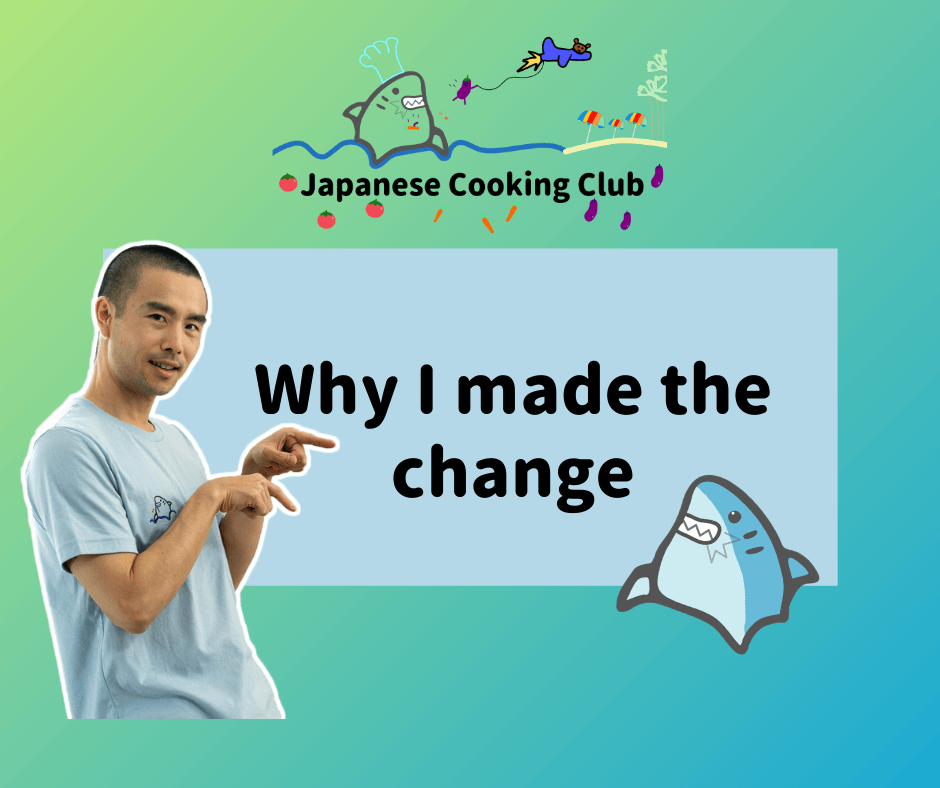
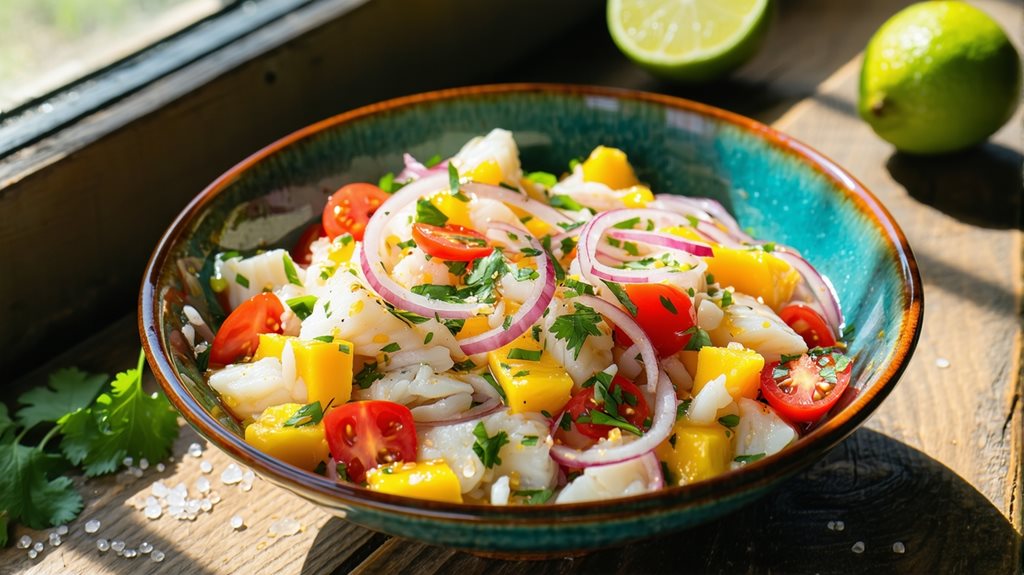
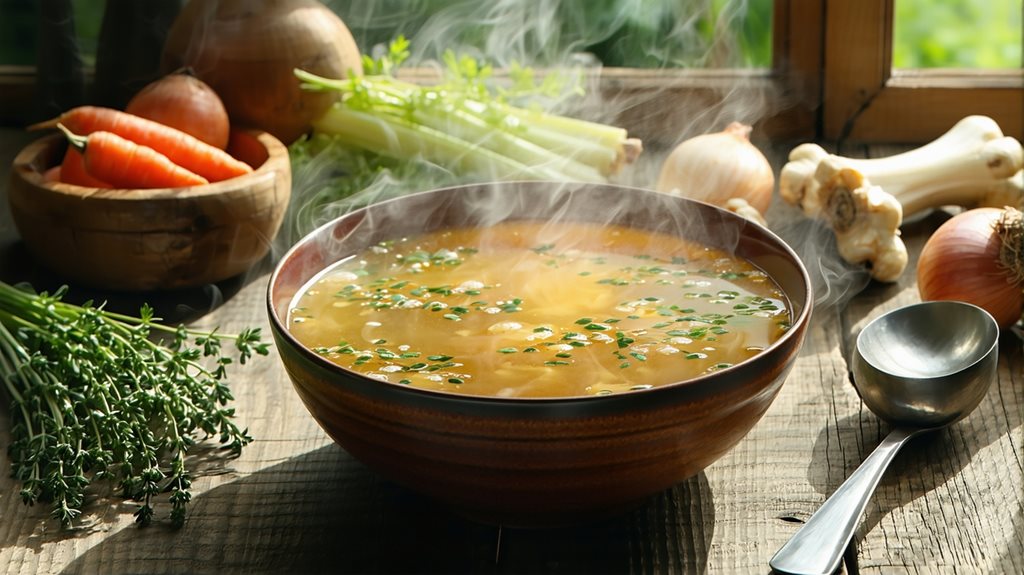
Konnichiwa! (Hello!) I'm Pat Tokuyama, a Japanese tofu cookbook author, who travels for music, food, and adventure. If you like Japanese tea, checkout some of the newestorganic japanese tea, matcha bowls and noren and more!
** Curious about the Plant Based Japanese Cooking Club? ** Learn more here!